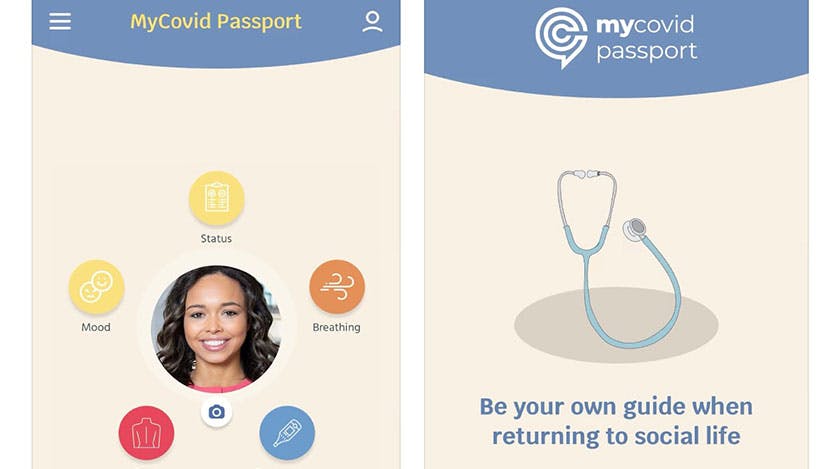New COVID-19 app helps users communicate health risks with each other

A new app helps users communicate a range of experiences concerning COVID-19 — from those who want to stay well to those who are under medical care for the disease. The app was developed in a collaboration between the University of Chicago Medicine and the social-benefit health tech startup PreeMe+You.
MyCovid Passport provides patients and those who want to stay well while re-engaging in social activities with a framework to understand their own and each other’s health status in five areas: breathing, temperature, body symptoms (such as fatigue or diarrhea), disease contact status and mental health. Users track symptoms according to best practices established by COVID-19 experts at the University of Chicago and keep up to date on the latest health information.
By answering a series of questions in each area, the user is assigned a color, ranging from red to blue, to indicate the severity of their symptoms. Users can then share this information with their friends, family members and physicians.
The app was developed by Bree Andrews, MD, MPH, neonatologist at the University of Chicago Medicine Comer Medicine Children’s Hospital, and medical anthropologist Yaya Ren, PhD, JD, who previously developed the PreeMe+You app to help parents of premature babies track their infants’ progress during their neonatal intensive care unit stay. For this app, they also partnered with Stephen Schrantz, MD, a UChicago Medicine internist who specializes in infectious diseases.
“We figured if we could teach parents to track their very premature babies’ complex health care, we could also teach people to track their COVID-19 symptoms,” Andrews said.
The group began working together on the app in early March, just as states were beginning lockdowns. Tests were hard to come by, and reliable information about the disease was elusive.
“We approached it as if we were taking a phone call from a patient,” Schrantz said. “We developed content as though we were answering their questions and guiding them through the disease. You have to think about all the different routes patients can take through the disease process.”
MyCovid Passport’s architecture aims to make this as easy as possible for users. Instead of laboring through websites, trying to decide whether their symptoms could indicate COVID-19, users can check in on the app and understand if they are well, slightly under the weather, or need to self-quarantine or visit a hospital.
The app also creates a visual symptom journal that users can share with family or friends to show they are healthy, or to indicate to themselves that they should decline group events. It also focuses on mental health and self-care, reminding patients that the disease and societal quarantine can affect their mood.
The group also is working with teens — a demographic that may be getting tired of social distancing — in order to help them avoid spreading the disease. MyCovid Passport empowers teens by providing them with a tool and health information framework so they can create their own safe social practices, which may be more effective than a parent or authority figure.
Ren emphasizes that privacy is a main concern of the startup, and that users’ data is only collected for the purposes of using the app. “We really just want to create thoughtful, empathic digital health tools,” she said.
Andrews and Schrantz are working with the UChicago Medicine Center for Healthcare Delivery Science and Innovation to pilot the app to explore using novel technology to disseminate health information, while minimizing disparities for patients. They also just received a pilot grant from the Bucksbaum Institute for Clinical Excellence at the University of Chicago to explore how best to integrate it with patient services.
“We want to help provide new modalities to help families navigate medical care,” Andrews said. “We want to create tools that fulfill those needs and help create positive and useful experiences.”
MyCovid Passport is free and available now in the App Store and on Google Play After downloading the app, use the code 123456 to get started.
